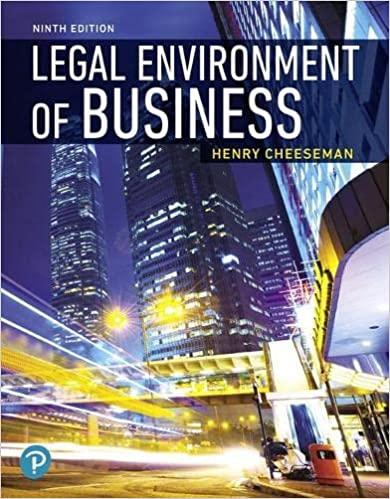Question
1) Andrew owes Baby P700,000. But the debt already prescribed. Later Candice, against the consent of Andrew, pays Baby the P700,000. It appears that Andrew
1) Andrew owes Baby P700,000. But the debt already prescribed. Later Candice, against the consent of Andrew, pays Baby the P700,000. It appears that Andrew here does not have to reimburse Candice because Andrew has not at all been benefitted by the transaction. However, Andrew later voluntarily reimburses Candice. Four days later, Andrew was hospitalized for COVID-19 at the Asian Hospital where he had a bill of more than P1 million. Andrew wants to recover the P700,000 from Candice. Can Andrew still recover what he has given to Candice?
a. No more, because it already has become a natural obligation.
b. Yes, because there would be undue advantage on the part of Candice if she will not return the money to Andrew.
c. Yes, because it is still possible to return the money, it being intact and not yet spent by Candice.
2) Which of the following is not void ab initio?
a. That whose object is outside the commerce of men
b. That which contemplates an impossible service
c. That whose object did not exist at the time of the transaction
3) Tigreal owes Farza P1M. Gord is the guarantor. A stranger, Hanabi, paid Farza the P1M with the consent of Tigreal and Farza.
Which of the following statements is true?
a. If Tigreal cannot pay the P1M, Hanabi can proceed against the guarantor, Gord.
b. Gord is liable to pay Farza for the inability of Tigreal to pay the P1M.
c. If Tigreal cannot pay the P1M, Hanabi can go after Farza who did not disclose that there was a guarantor Gord.
4) The following are persons incapacitated to give consent, except _____________.
a. Minors
b. Deaf-mutes who do not know how to write
c. Insane persons during a lucid interval
5) Cameron shipped his cargo to Stan's vessel. Stan and Steven's company entered into a contract for Steven's company to unload the cargo from the ship's hold. In the lifting operations, Cameron's cargo was damaged. May Cameron successfully sue Steven's company for damages?
a. No, he cannot. Applying the principle of relativity of contracts, Cameron is not privy to the contract between B and C, and is therefore not in legal standing to file a suit against Steven.
b. Yes, he can. Applying the principle of autonomy of contracts, Cameron and Stan are free to stipulate anything in their contract provided it is not contrary to law, morals, public order and public policy.
c. No, he cannot. Applying the principle of mutuality of contracts, Cameron is not allowed to go after Steven's company who is mutually bound to observe its contract with Stan.
Step by Step Solution
There are 3 Steps involved in it
Step: 1

Get Instant Access to Expert-Tailored Solutions
See step-by-step solutions with expert insights and AI powered tools for academic success
Step: 2

Step: 3

Ace Your Homework with AI
Get the answers you need in no time with our AI-driven, step-by-step assistance
Get Started


